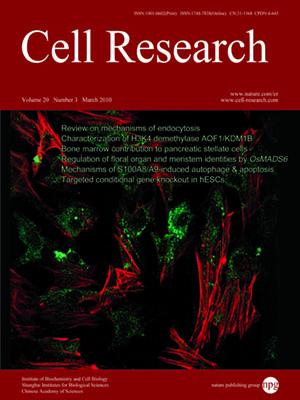
Volume 20, No 3, Mar 2010
ISSN: 1001-0602
EISSN: 1748-7838 2018
impact factor 17.848*
(Clarivate Analytics, 2019)
Volume 20 Issue 3, March 2010: 367-378
ORIGINAL ARTICLES
VEGI-armed oncolytic adenovirus inhibits tumor neovascularization and directly induces mitochondria-mediated cancer cell apoptosis
Tian Xiao1,*, Junkai Fan1,*, Hongling Huang1, Jinfa Gu1, Lu-Yuan Li2 and Xin Yuan Liu1,3
1Laboratory of Molecular Cell Biology, Institute of Biochemistry and Cell Biology, Shanghai Institutes for Biological Sciences, Chinese Academy of Sciences, Shanghai 200031, China
2Department of Pathology, University of Pittsburgh Medical Center, Pittsburgh, PA 15213, USA
3Xinyuan Institute of Medicine and Biotechnology, Zhejiang Sci-Tech University, Hangzhou 310018, China
Correspondence: Xin Yuan Liu, Lu-Yuan Li,(xyliu@sibs.ac.cn; lil@upmc.edu)
Vascular endothelial cell growth inhibitor (VEGI) is a member of the tumor necrosis factor superfamily and plays an important role in vascular homeostasis. In this study, to investigate the anticancer therapeutic potential of this gene, a secreted isoform of VEGI (VEGI-251) was inserted into a selectively replicating adenovirus with E1B 55 kDa gene deletion (ZD55) to construct ZD55-VEGI-251. We report here that secreted VEGI-251 produced from ZD55-VEGI-251-infected cancer cells potently inhibits endothelial cell proliferation, tube formation in vitro and angiogenesis of chick chorioallantoic membrane in vivo. Additionally, ZD55-VEGI-251 infection leads to a much more severe cytopathic effect than control viruses on several human cancer cell lines, including cervical cancer cell line HeLa, hepatoma cell line SMMC-7721 and colorectal cancer cell line SW620. Further study reveals that the increased cytotoxicity is a result of VEGI-251 autocrine-dependent, mitochondria-mediated apoptosis accompanied by caspase-9 activation, enhanced caspase-3 activation and PARP cleavage. Moreover, ZD55-VEGI-251-treatment of athymic nude mice bearing human cervical and colorectal tumor xenografts markedly suppressed tumor growth. Our findings indicate that the combined effect of antiangiogenesis and apoptosis-induction activity makes the VEGI-251-armed oncolytic adenovirus a promising therapeutic agent for cancer.
Vascular endothelial cell growth inhibitor (VEGI) is a member of the tumor necrosis factor superfamily and plays an important role in vascular homeostasis. In this study, to investigate the anticancer therapeutic potential of this gene, a secreted isoform
FULL TEXT | PDF
Browse 2218


